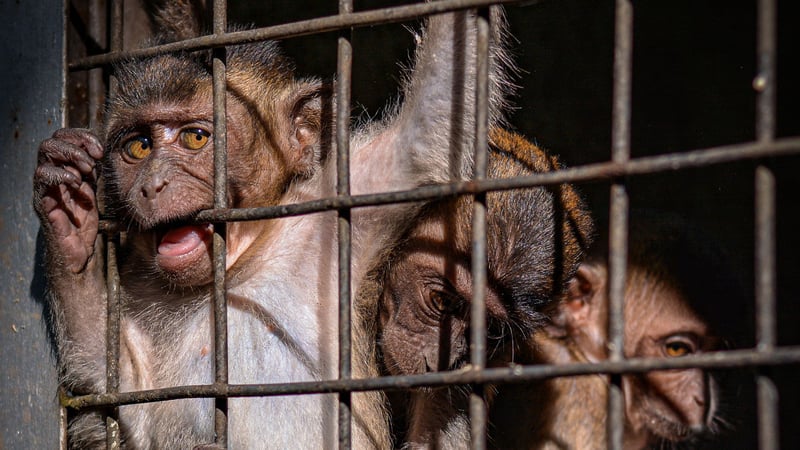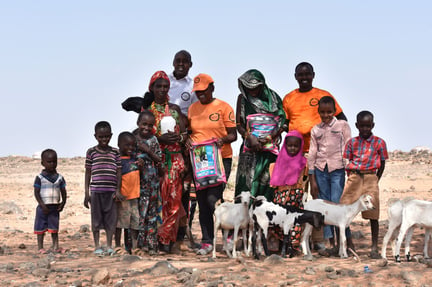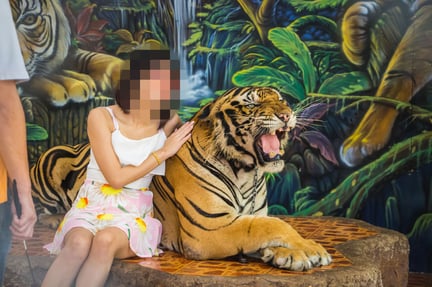
Rescued: 30 monkeys forced to dance to be rescued by charities
Press release
Jakarta Animal Aid Network, with the support of World Animal Protection, is set to rescue 30 dancing monkeys from the last dance training village in Cirebon, Indonesia this autumn.
The monkeys were taken from the wild at only 8 months old to be trained to dance for shoppers and tourists on the street. They watched their mothers get shot before being grabbed by their own tails and thrown into sacks by poachers.
Since their capture, these bewildered young monkeys have been subjected to the cruellest training regime imaginable. Starved, hanged, beaten and chained by the neck, they have been forced to wear masks, dressed as dolls, and made to stand on two legs for hours. They are trained to do dance steps, ride bicycles and perform tricks for shoppers and tourists on the streets.
When they aren't dancing, they are often kept in tiny single cages for prolonged periods of time
The practice of dancing monkeys for entertainment is known as Topeng Monyet in Indonesia, which literally translates to "monkey mask": The practice not only raises concerns about animal welfare, but it also poses a high risk of zoonotic diseases such as tuberculosis and salmonella.
Long-tailed macaques are one of the most traded and exploited primates in Indonesia. Due to their remarkable intelligence and social skills, this species has sadly become a target of the entertainment, pet and research industries. Years of exploitation have led to this species becoming endangered.
The rescue mission will involve evacuating the monkeys to Cikole, West Java, where they will be medically assessed, treated and go through a quarantine process. If suitable for release they will then have a chance of a new life in protected, natural forests.
The monkey handlers will be supported into finding alternative livelihoods that don't involve harming animals, so that the venue can be completely shut down.
Dr. Jan Schmidt-Burbach, Head of Animal Welfare and Research at World Animal Protection, said:
"Macaques are wild animals. They are not born to dance. Wild animals have a right to live where they belong: in the wild."
"Our partners Jakarta Animal Aid Network (JAAN) and local authorities have made great progress in stamping out the dancing monkey trade across much of Indonesia over the last 15 years. We are proud to support them in shutting down this final venue of this practice."
"Whilst Cirebon is the final dancing village, the Topeng Monyet practice itself is not yet illegal. JAAN's ultimate aim is to ban the monkey dancing practice in Indonesia for good. We are supporting JAAN in their work with local authorities and charities to achieve this complete ban."
Macaques aren't the only animals suffering in abysmal conditions for human entertainment. World Animal Protection's Bred for Profit research indicated that around 5.5 billion animals are kept in wildlife farms across the world, often in appalling conditions, for entertainment or tourist attractions, for petting, or to be turned into ornaments, luxury food, fashion products or traditional medicine. The charity is fighting to bring an end to all wild animals that are kept in captivity for entertainment or profit purposes.
World Animal Protection has now launched a cash appeal to support the macaques rescue mission. The funds raised will be used to provide food and veterinary care for the monkeys, and to ensure their relocation in the most optimal conditions. XXX[LH2]
Ends
Note to editors:
For more information, or to arrange an interview with a spokesperson, contactc Bev Boyle at bevboyle@worldanimalprotection.org.XXX[LH3]
About World Animal Protection
World Animal Protection is the global voice for animal welfare, with more than 70 years' experience campaigning for a world where animals live free from cruelty and suffering. Our work to protect animals will play a vital role in solving the climate emergency, the public health crisis and the devastation of natural habitats.
We have offices in 12 countries and work across 47 countries. We collaborate with local communities, the private sector, civil society and governments to change animals' lives for the better.
Our goal is to change the way the world works to end animal cruelty and suffering for both wild and farmed animals. Through our global food system strategy, we will end factory farming and create a humane and sustainable food system, that puts animals first. By transforming the broken systems that fuel exploitation and commodification, we will give wild animals the right to a wild life.
Together, we will change the way the world works and end animal cruelty and suffering. Forever.
About Jakarta Animal Aid Network (JAAN)
JAAN has over a decade of experience combating "Topeng Monyet", having successfully shut down the infamous Madion dancing monkey village and rehabilitated over 130 ex-dancing monkeys to date. They have the expertise, government partnerships, and infrastructure to lead this operation effectively.

